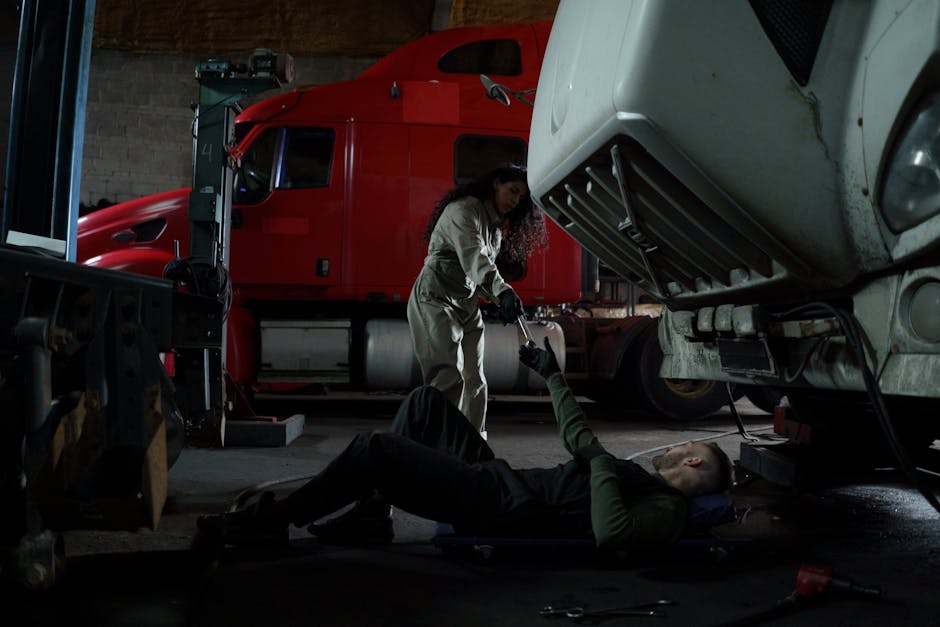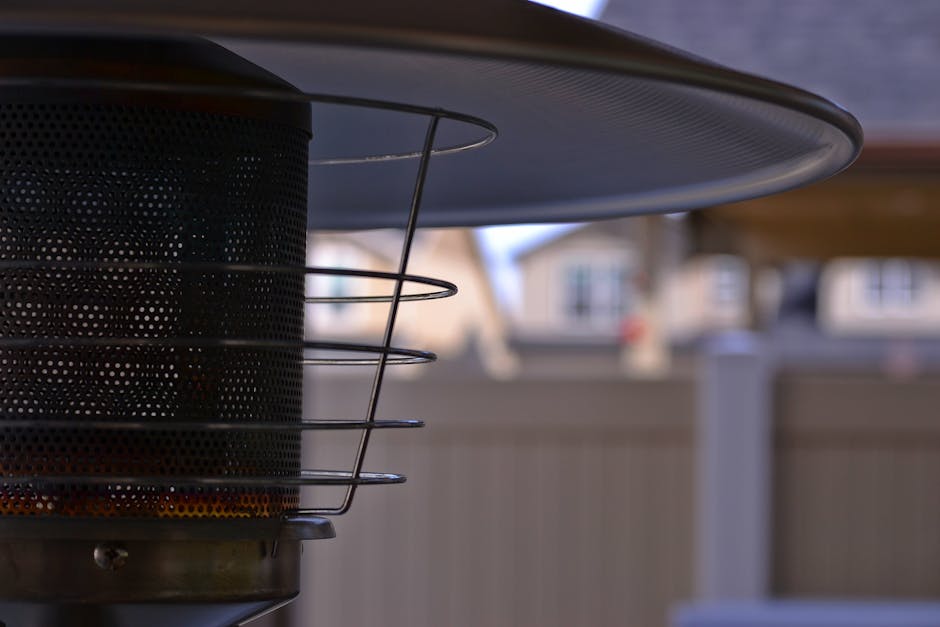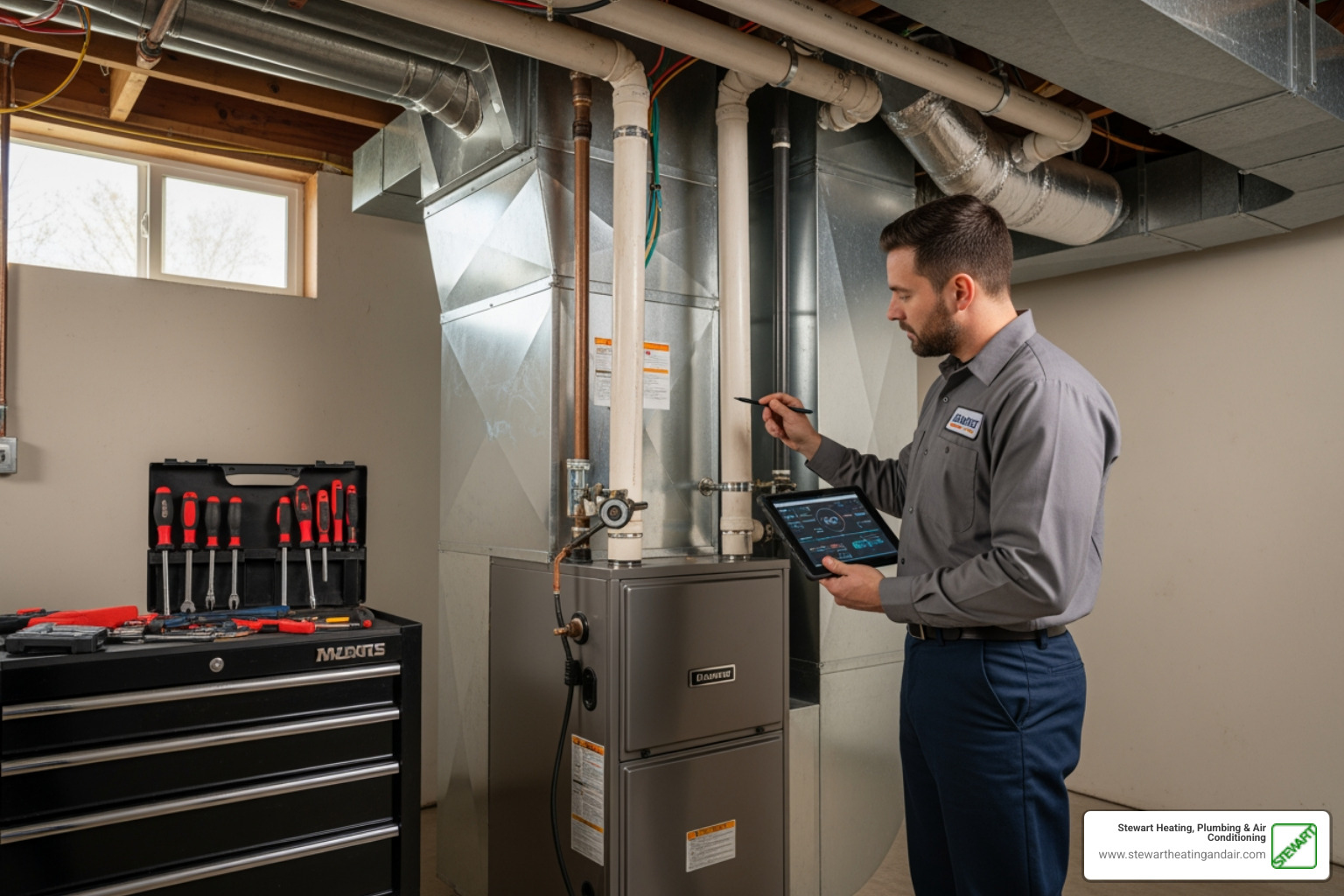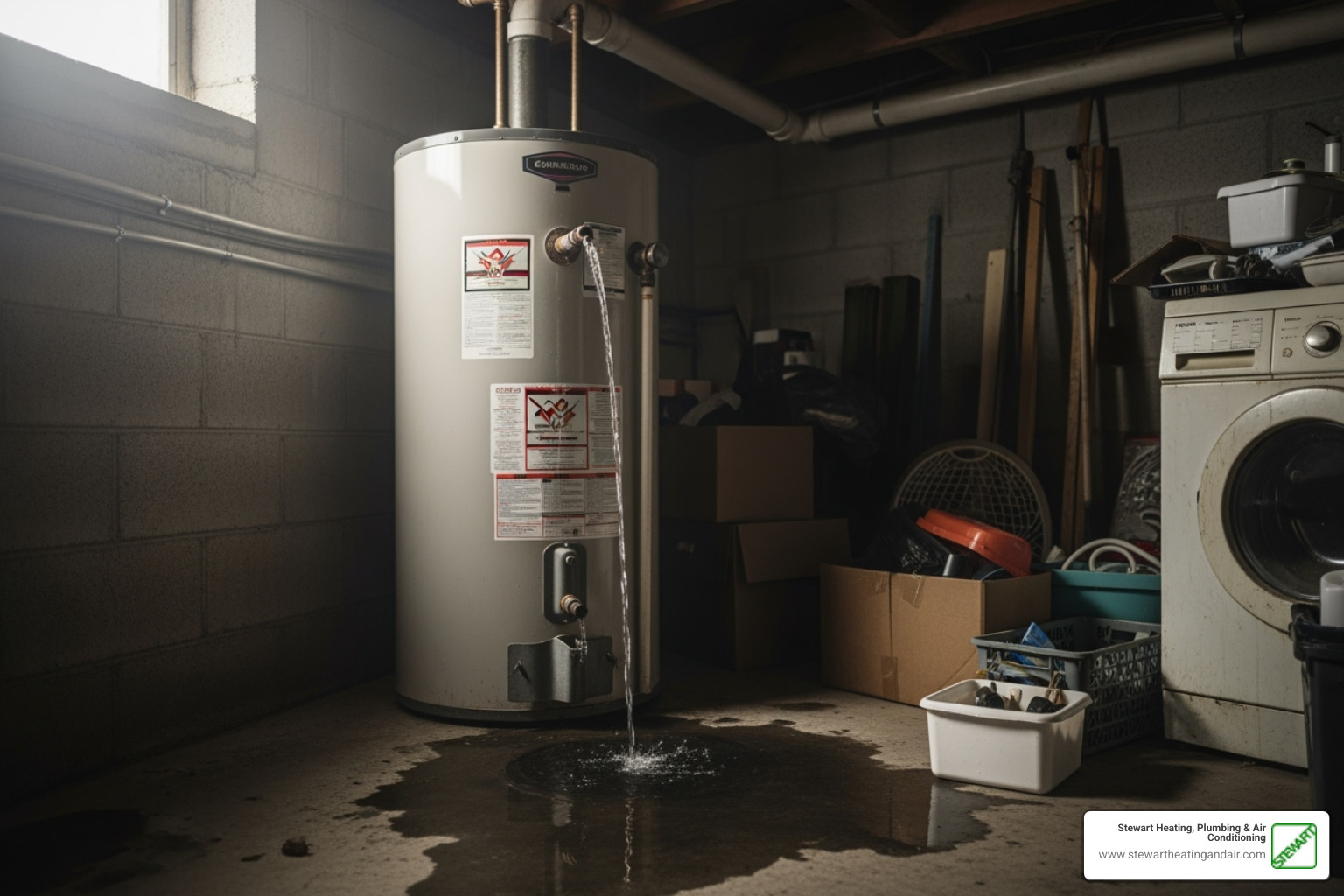
Why Is My Water Heater Acting Up?
Hot water heater problems can quickly turn your morning routine into a frustrating, cold shower. Your water heater is one of the hardest-working appliances in your home, but when it acts up, you'll notice immediately.
Most common water heater problems include:
- No hot water - Often due to power issues, a pilot light outage, or faulty heating elements.
- Inadequate hot water - Can be caused by sediment buildup, an undersized tank, or thermostat problems.
- Strange noises - Popping or rumbling sounds usually indicate sediment.
- Leaks - Check around the tank base, valves, and pipe connections.
- Discolored or smelly water - Suggests rust, bacteria, or anode rod failure.
- High energy bills - A sign of reduced efficiency from sediment or failing parts.
Your water heater typically lasts 8 to 12 years, but issues can arise anytime, especially without proper maintenance. While many problems have straightforward solutions, safety must always come first. Gas leaks, electrical issues, and scalding water require immediate professional attention. Understanding these warning signs early can save you from costly repairs and unexpected breakdowns.
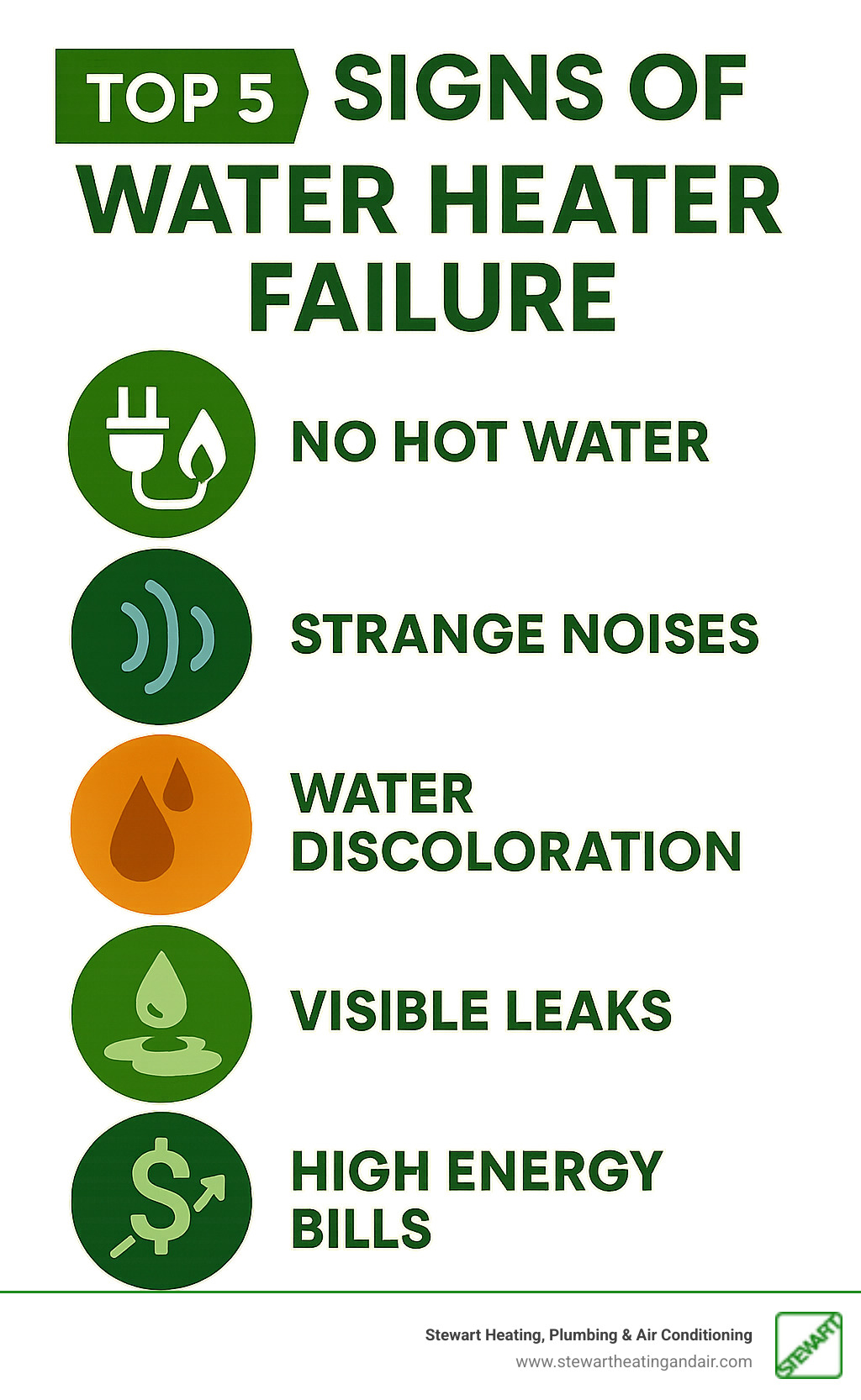
First Warning Signs: Is Your Water Heater Failing?
Your water heater will usually show signs of trouble before it fails completely. Knowing how to spot these signals can help you avoid a full-blown emergency.
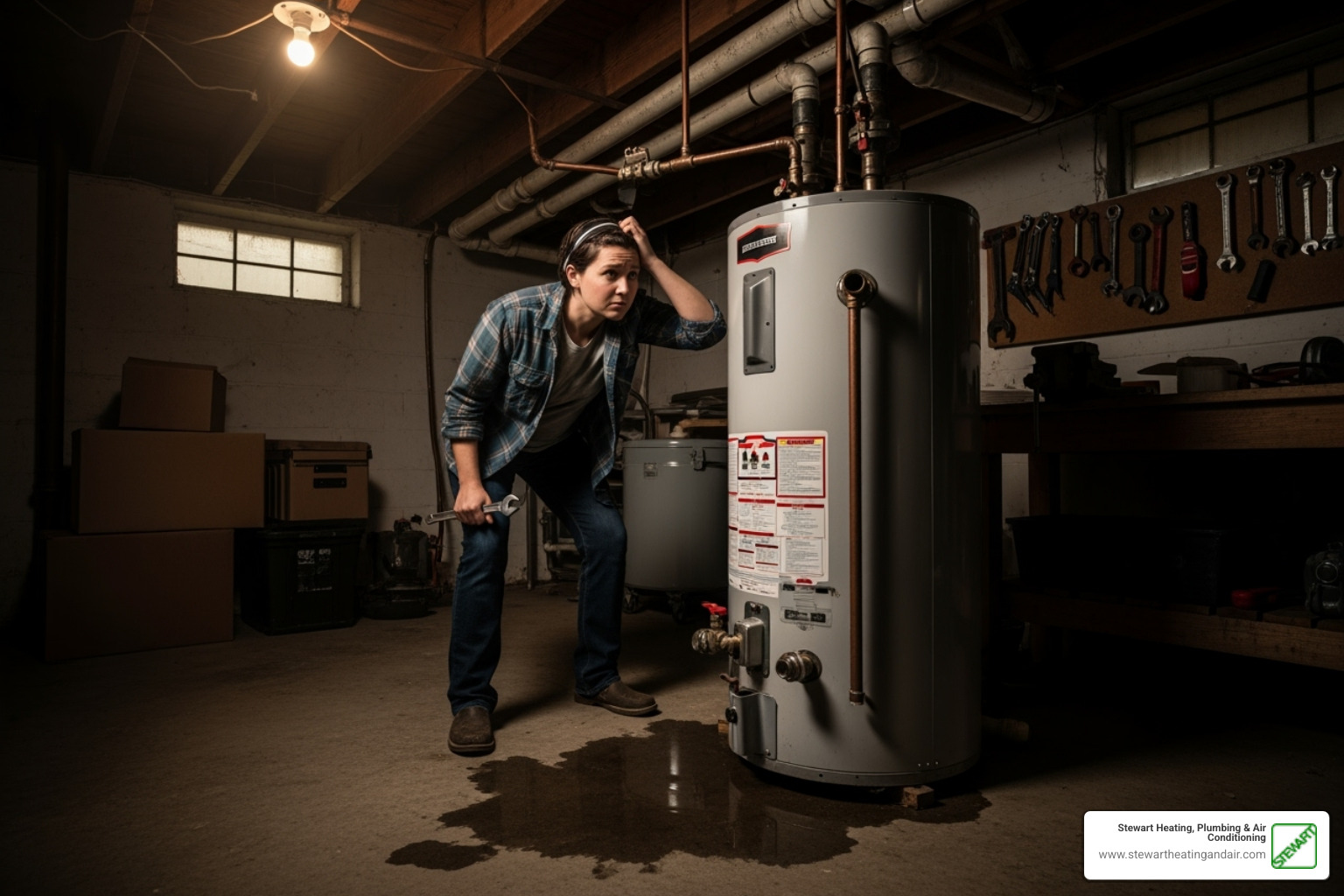
The most obvious red flag is no hot water or inadequate hot water that runs out faster than usual. This is your water heater's clearest signal that something is wrong.
Temperature fluctuations, where the water goes from hot to cold unexpectedly, often point to a faulty thermostat or a failing temperature sensor that can't maintain consistent heat.
If your hot water pressure drops while cold water pressure remains strong, sediment buildup is the likely culprit, restricting flow from the tank.
Strange noises like popping sounds or rumbling sounds are hard to ignore. They are typically caused by a layer of sediment at the bottom of the tank that gets superheated, causing water trapped beneath it to boil and pop.
Discolored water (rusty or cloudy) from your hot water taps suggests internal corrosion, possibly from a depleted anode rod. A smelly water with a rotten egg odor usually means bacteria are growing in the tank, often because the temperature is set too low.
Leaks are an urgent warning sign. Puddles around the base, dripping valves, or moisture on pipes mean trouble. A small leak can quickly become a major flood.
Finally, don't overlook unexplained high energy bills. If your water heater is working harder to produce the same amount of hot water, it's consuming more energy. Catching these hot water heater problems early gives you the advantage.
Diagnosing Common Hot Water Heater Problems
When your water heater acts up, a few key signs can point you to the source of the problem. Here's how to diagnose the most common hot water heater problems.
No Hot Water or Lukewarm Water
When you're faced with no hot water or water that's barely warm, start with these checks.
Power source issues are a common cause. For electric heaters, check for a tripped circuit breaker. Try flipping it off and on again. Also, look for a red reset button on the unit itself and press it firmly. For gas heaters, a pilot light has gone out is a frequent issue. Check your tank for relighting instructions and ensure the gas supply valve is open.
Thermostat problems can also be the cause. If the thermostat is set too low or is malfunctioning, the water won't heat correctly. Electric heaters have two thermostats, and a failure in either can affect performance.
Heating elements in electric units can burn out, especially if covered in sediment. A failed lower element results in hot water that runs out quickly, while a failed upper element can mean no hot water at all.
Sediment buildup insulates the water from the heating source, reducing efficiency and performance.
An undersized water heater may also be the issue if your household consistently runs out of hot water.
For expert help with these tricky repairs, check out our comprehensive Water Heater Repair in Concord, CA services.
Leaks and Puddles Around the Tank
Finding water around your water heater requires immediate investigation.
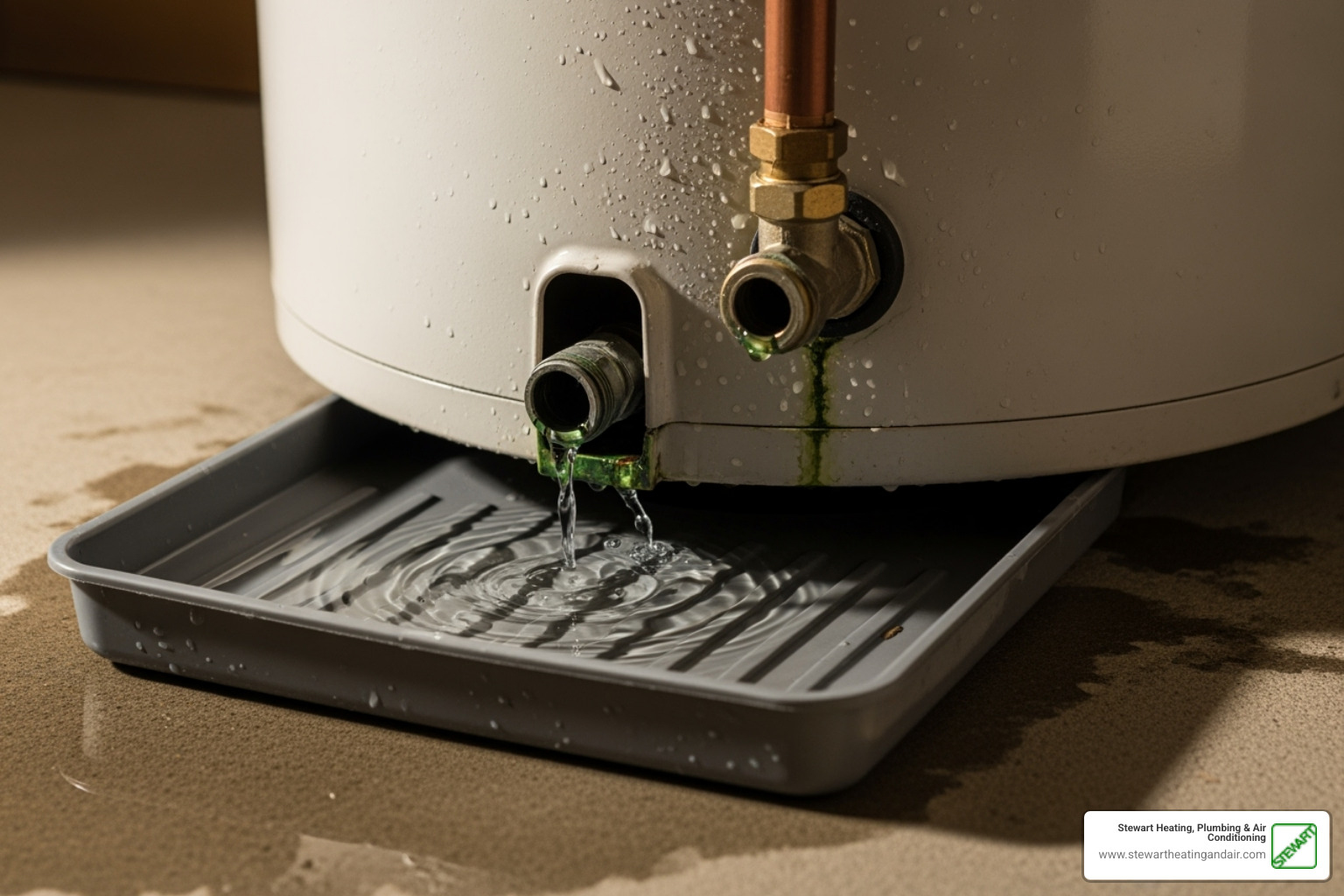
The temperature and pressure relief valve (T&P valve) may be leaking. If it's dripping, it could be doing its job of releasing excess pressure, or the valve itself could be faulty.
Drain valve leaks at the bottom of the tank can sometimes be fixed by tightening the valve. If that doesn't work, it may need replacement.
Loose pipe connections can also cause leaks. A careful tightening might solve the problem, but call a professional if there's significant corrosion.
The most serious cause is a cracked internal tank, usually resulting from corrosion and sediment buildup. A cracked tank cannot be repaired and requires a full unit replacement.
If your water heater is showing signs of internal tank failure, it's time to explore your options for Water Heater Replacement in Brentwood, CA.
Sediment, Limescale, and Poor Water Quality
Your water quality directly impacts your water heater's health.
Sediment buildup from minerals in the water settles at the bottom of the tank, causing inefficiency, strange noises, and hot spots that can damage the tank.
Hard water contributes to limescale deposits on heating elements and pipes, forcing the unit to work harder.
Rusty, discolored water is a sign of internal corrosion, which often means the protective anode rod has been completely used up and the tank itself is now rusting.
A rotten egg smell indicates bacteria in the tank, often due to low water temperature settings or anode rod failure.
Understanding how your local water conditions affect your system can help you make informed decisions. Learn more about Water Heaters in Antioch, CA and how different models handle various water quality challenges.
Troubleshooting by Type: Gas vs. Electric Water Heaters
While many hot water heater problems are universal, some are specific to gas or electric models. Understanding your unit's type is the first step in troubleshooting.
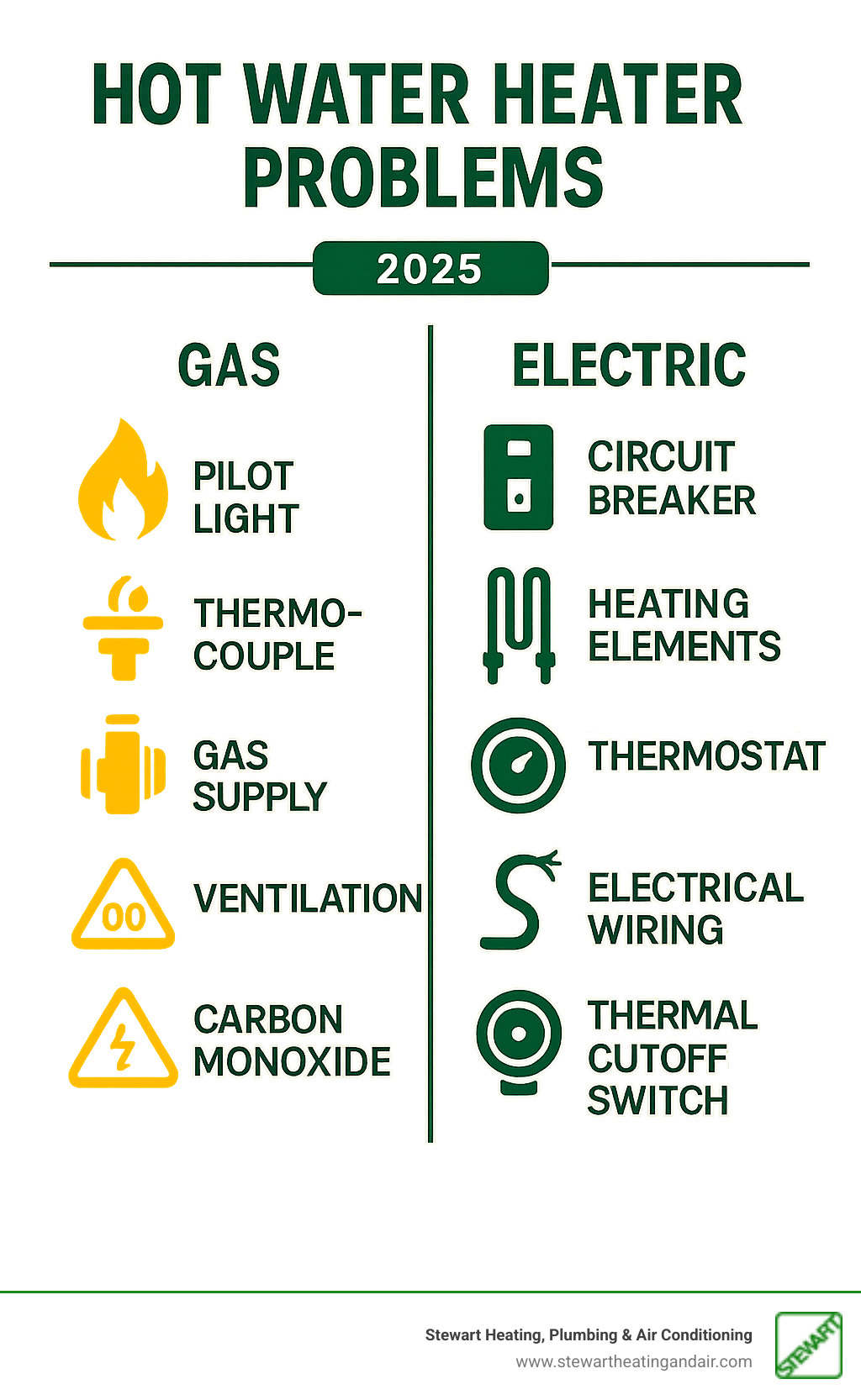
Common electric hot water heater problems and solutions
Electric water heaters are relatively simple, but when they fail, it's usually an electrical issue.
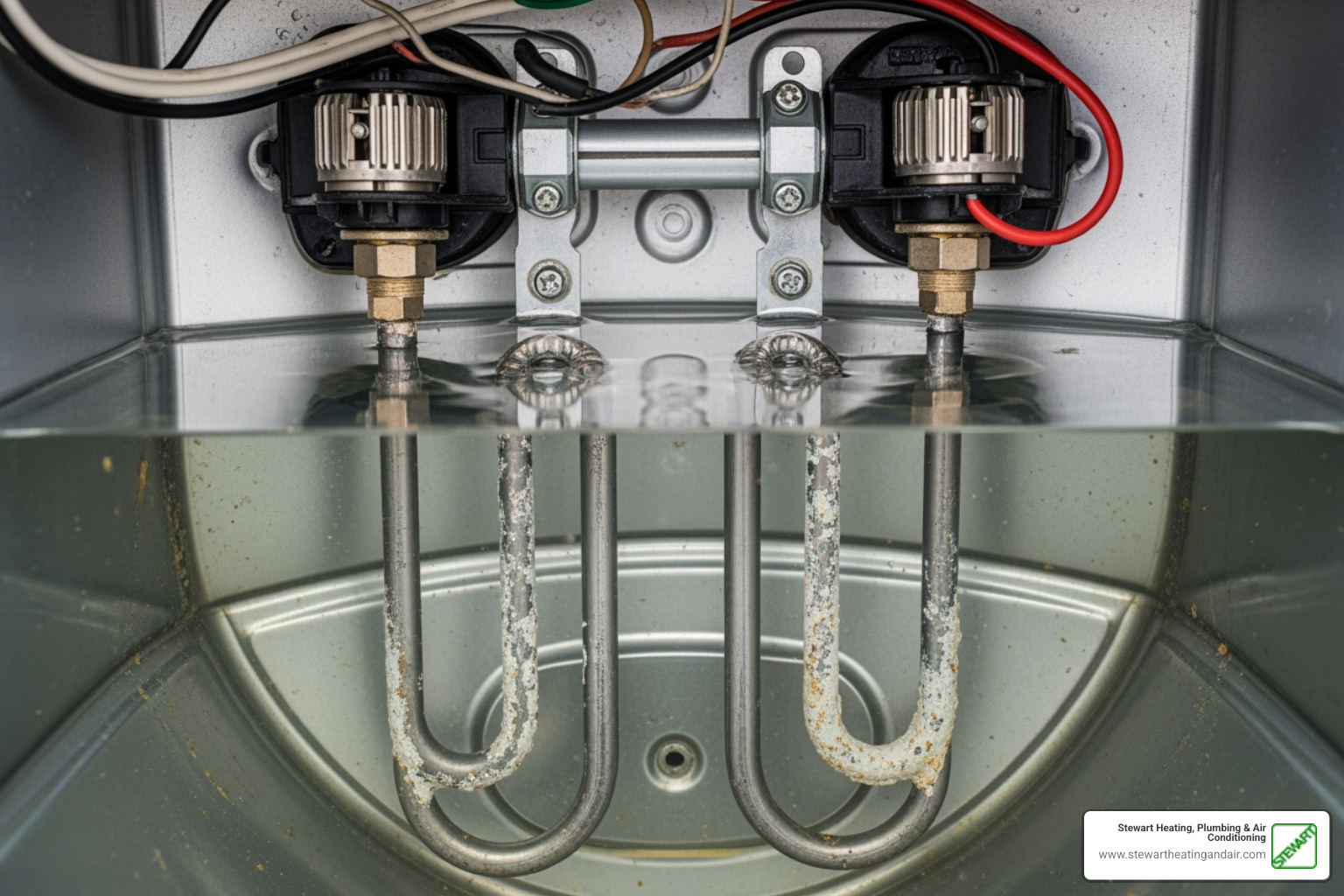
Circuit breaker issues are a frequent problem. These units draw a lot of power and can trip a breaker. Your first step for no hot water should be to check the electrical panel.
Many units have a high-temperature cutoff reset button, usually a red button located near the upper thermostat. If the water gets too hot, this safety switch trips. After turning off the power at the breaker, you can press this button to reset it.
Faulty heating elements are another common issue. These coils can burn out or become ineffective due to limescale buildup. If the lower element fails, you'll have a small amount of hot water that runs out quickly. If the upper element fails, you may have no hot water at all.
Thermostat failure can cause erratic temperatures. Each heating element has a thermostat, and if one fails, it can't properly regulate when the element turns on or off.
Loose or corroded electrical connections can also prevent power from reaching the components. Always turn off power at the breaker before inspecting any wiring.
If you're wrestling with electric water heater troubles and need expert help, we've got your back. More info about Electric Water Heaters in Antioch, CA
Common gas hot water heater problems and solutions
Gas water heaters involve combustion, making them more complex and requiring a focus on safety.
Pilot light issues are a classic problem. If the pilot light goes out, the main burner won't ignite. Instructions for relighting the pilot are typically printed on the tank.
The thermocouple is a safety device that senses the pilot flame. If it's dirty or faulty, it will shut off the gas supply, causing the pilot to go out repeatedly.
Check that the gas supply valve is fully open. Sometimes it can be accidentally partially closed, restricting gas flow.
The burner assembly can get clogged with dust or debris, leading to a weak or yellow flame. A strong flame should be blue; a yellow flame indicates incomplete combustion and a potential carbon monoxide hazard.
Ventilation issues are a serious safety risk. The vent pipe that removes combustion gases like carbon monoxide must be clear and correctly installed. Blockages can cause dangerous gases to build up in your home.
Gas leaks are an emergency. If you smell gas (a rotten egg odor), turn off the gas supply, ventilate the area, and evacuate. Do not use any electronics or create a spark. Call your gas company or a qualified professional immediately.
For expert assistance with your gas water heater, especially when it comes to gas lines or ventilation concerns, we're here to help keep your family safe. More info about Gas Water Heaters in Oakley, CA
DIY vs. Calling a Professional: When to Make the Call
When facing a water heater issue, you need to decide: is this a DIY job or time to call a professional? Safety always comes first. Water heaters involve high temperatures, pressure, electricity, and sometimes gas, a combination that demands respect.
Simple DIY Tasks You Can Handle
Some hot water heater problems are manageable for a handy homeowner.
- Flushing your tank annually removes sediment buildup and is the best maintenance you can perform.
- Checking the pilot light on a gas heater and relighting it using the instructions on the tank is often straightforward.
- Adjusting your thermostat settings is simple. The EPA recommends 120°F to balance safety and efficiency, though some prefer 140°F. Settings below 120°F can risk bacteria growth.
- Resetting a tripped breaker or the unit's reset button is a common first step for electric models.
- Tightening minor leaks from loose pipe connections can sometimes be done with a wrench after shutting off the water supply.
When It's Time to Call the Professionals
Certain jobs are best left to trained technicians.
- Gas leaks are an emergency. If you smell gas, turn off the supply, evacuate, and call for professional help immediately.
- Major electrical work, such as replacing heating elements or thermostats, involves high voltage and should be handled by a pro.
- Tank replacement is a complex job that involves disconnecting water, gas, or electrical lines and moving a heavy appliance.
- If your pilot light keeps going out, it likely indicates a faulty thermocouple or gas control valve that needs professional diagnosis.
- The risk of scalding from high temperatures is serious. If adjusting the thermostat doesn't fix overheating, a professional should investigate. The risk of scalding from high temperatures is a real danger.
The golden rule: if you feel unsure, don't risk it. Your safety is worth more than the cost of a service call.
When you're ready for professional help with your hot water heater problems, we're here to help. More info about Water Heater Repair in Danville, CA
Preventative Maintenance: How to Extend Your Water Heater's Life
Regular maintenance can significantly extend your water heater's lifespan, improve efficiency, and help you avoid unexpected hot water heater problems.
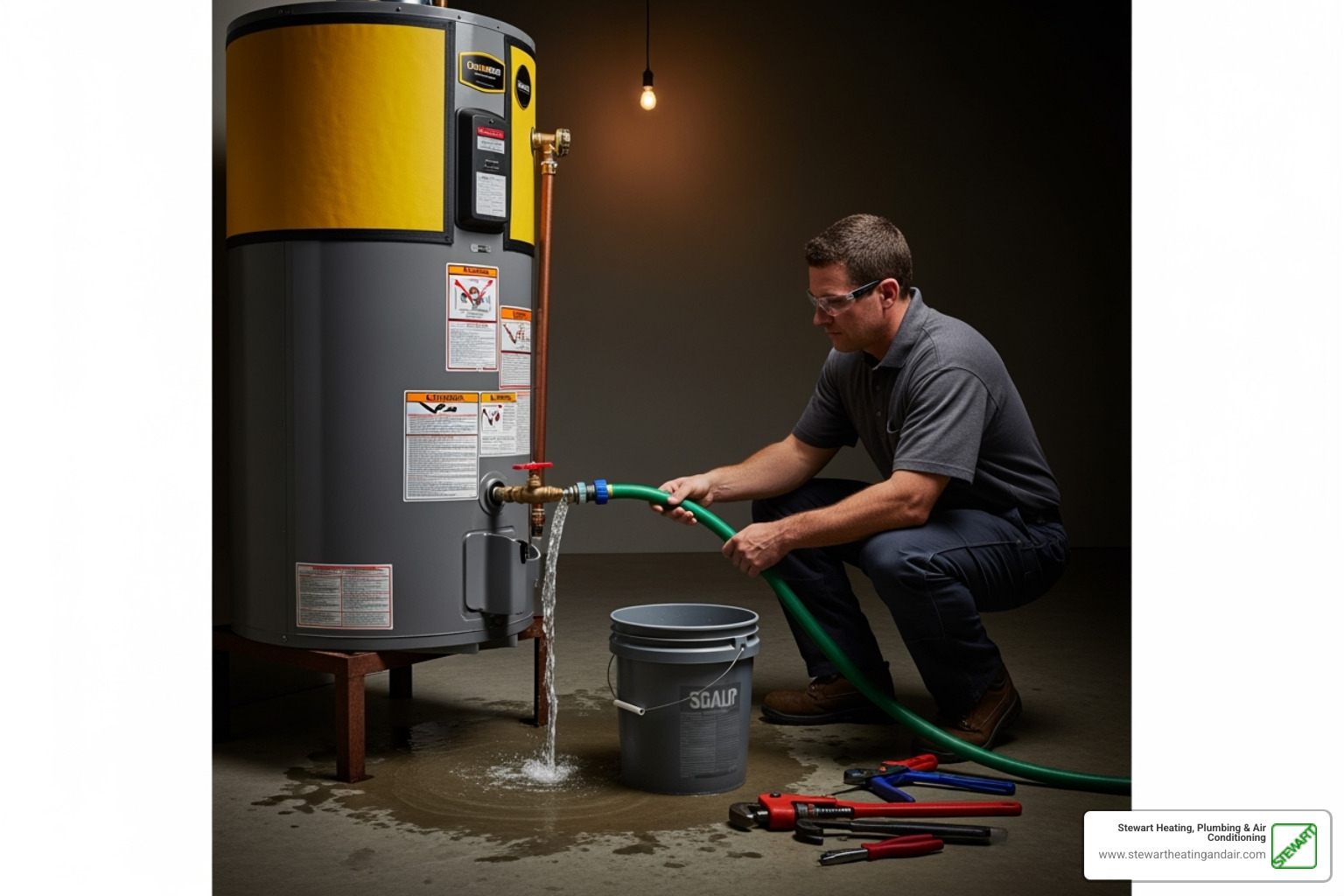
Here are some essential maintenance tips:
- Annual Flushing: This is the most critical task. Draining and flushing your water heater once a year removes mineral deposits, ensuring better efficiency and preventing internal damage. If you have hard water, consider flushing more often.
- Testing the T&P Valve: Once or twice a year, test the temperature and pressure relief valve to ensure it works. Lift the lever to release a burst of water. If it doesn't release water or continues to drip, it may need replacement.
- Inspecting the Anode Rod: The anode rod protects the tank from rust. It should be inspected every few years and replaced if heavily corroded. This can prevent rusty or smelly water.
- Checking Temperature Settings: Set your water heater between 120°F and 140°F to balance energy efficiency with preventing bacteria growth and scalding risks.
- Inspecting for Leaks and Corrosion: Regularly look for any signs of leaks, rust, or corrosion on the tank and its connections. Early detection can prevent major water damage.
- Keeping the Area Clear: Ensure the area around your water heater is clear, especially for gas models that require proper airflow for safe combustion.
- Insulating Pipes: Insulating the first few feet of hot water pipes leaving the heater reduces heat loss and saves energy.
Performing these tasks helps ensure consistent hot water and a longer life for your appliance.
For professional water heater maintenance and to ensure your unit is in top shape, reach out to us. More info about Water Heater Maintenance in Walnut Creek, CA
Frequently Asked Questions about Water Heater Issues
We've helped countless homeowners in Pittsburg, CA, and Contra Costa County with their hot water heater problems. These are the questions we hear most often.
What is the most common cause of water heater failure?
The single biggest culprit is sediment buildup. Over time, minerals from the water supply settle at the bottom of the tank, forming a thick layer. This forces the heating elements or burner to work much harder, leading to reduced efficiency, strange noises, and hot spots that can damage and crack the tank. This damage happens silently, which is why a lack of maintenance—specifically, not flushing the tank annually—is the primary reason most water heaters fail prematurely. Corrosion and age are also factors, but proper care can mitigate them.
How do I know if my water heater needs to be replaced?
Deciding to repair or replace can be tough. Here are the key signs that replacement is the smarter choice:
- Age: If your unit is over 10 years old, it's living on borrowed time. Most last 8-12 years.
- Frequent repairs: If repair costs are adding up and approaching half the cost of a new unit, it's time to upgrade.
- Rusty water: If hot water from your taps is rusty, it's a sign the inside of the tank is corroding, and failure is imminent.
- Major leaks: While a dripping valve can be fixed, water leaking from the tank itself indicates a crack. This is not repairable and requires immediate replacement to avoid water damage.
- Inadequate hot water: If your heater can no longer meet your family's needs, it may be time for a larger or more efficient model.
How often should a water heater be flushed?
We recommend flushing your water heater at least once a year. For homes with very hard water, flushing every six months may be necessary to prevent heavy sediment accumulation.
Regular flushing is the best way to prevent the sediment buildup that causes most failures. The benefits include improved heating efficiency (lower energy bills), quieter operation, and a significantly longer lifespan for your appliance. It's a simple maintenance task that offers a huge return on investment.
Conclusion: Get Your Hot Water Flowing Again
Dealing with hot water heater problems is a major inconvenience, but you don't have to face it alone. From strange noises and discolored water to a complete lack of hot water, understanding the warning signs is the first step toward a solution.
We've covered the differences between gas and electric models, what you can safely fix yourself, and when it's crucial to call a professional. Gas leaks and major electrical work are not DIY projects. The most effective strategy is preventative maintenance. An annual tank flush can save you from the headache and expense of a premature failure and water damage.
At Stewart Heating, Plumbing & Air Conditioning, our reputation is built on doing things right the first time, earning referrals from satisfied customers across Pittsburg, CA, and Contra Costa County. When you're facing hot water heater problems, our team will diagnose the issue accurately and restore your hot water quickly.
Don't let a faulty water heater disrupt your life. Whether you need a repair, maintenance, or a replacement, we have the expertise to bring comfort back to your home.
Schedule your Water Heaters service today and let us bring the warmth back to your home!





